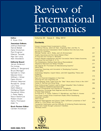
Review of International Economics
Scope & Guideline
Bridging theory and practice in international economics.
Introduction
Aims and Scopes
- International Trade Dynamics:
The journal focuses on the complexities of international trade, including trade agreements, tariffs, and the effects of trade policies on various economies and sectors. - Foreign Direct Investment (FDI):
Research on FDI is a core area, examining the determinants, impacts, and strategic decisions of multinational firms in a globalized economy. - Macroeconomic Interactions:
The journal explores macroeconomic factors influencing global economic stability, including monetary policies, exchange rates, and capital flows. - Labor Market Implications:
A significant research focus is on the interaction between international trade and labor markets, analyzing how trade policies affect employment, wages, and labor dynamics. - Environmental and Social Considerations:
The journal incorporates studies on the environmental impacts of trade and economic policies, including sustainability and regulatory frameworks. - Quantitative Economic Modeling:
The journal employs advanced quantitative methodologies to analyze economic phenomena, utilizing econometric models to derive insights from data.
Trending and Emerging
- Impact of Digitalization on Trade:
Research exploring the role of digital technologies in transforming trade practices and enhancing international competitiveness is gaining traction. - Global Supply Chains and Resilience:
The journal increasingly addresses the complexities of global supply chains, particularly in the context of recent global disruptions and the need for resilience. - Economic Sanctions and Trade Dynamics:
There is a growing focus on the effects of economic sanctions on international trade, examining their implications for both targeted and non-targeted countries. - Labor Mobility and Immigration Economics:
Emerging themes include the impacts of immigration and labor mobility on economic performance, highlighting the interplay between labor markets and international trade. - Sustainability and Trade Regulations:
Research on how sustainability concerns shape trade regulations and practices is becoming more prominent, reflecting a global shift towards environmentally responsible policies. - Interconnections between Trade and Health:
The intersection of trade policies and public health outcomes is an emerging area of interest, particularly in light of recent global health crises.
Declining or Waning
- Traditional Trade Theories:
Research grounded in classical trade theories has become less prominent, as newer, more complex models that incorporate factors like technology and globalization dynamics take precedence. - Static Economic Models:
The reliance on static models for analyzing trade impacts has waned, with a shift towards dynamic models that consider time-varying effects and non-linearities in economic relationships. - Focus on Single-Country Studies:
There has been a noticeable decline in papers focusing solely on single-country analyses, as the journal increasingly emphasizes comparative and cross-country studies. - Limited Exploration of Historical Economic Contexts:
Research that solely examines historical economic contexts without connecting them to contemporary issues or global trends has decreased.
Similar Journals
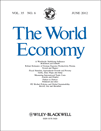
WORLD ECONOMY
Exploring the dynamics that shape our world economy.WORLD ECONOMY is a premier academic journal published by Wiley, renowned for its rigorous peer-reviewed research in the fields of economics, finance, accounting, and political science. Established in 1977, the journal has consistently contributed to the advancement of knowledge, reflected in its strong standing across various category quartiles, notably achieving Q1 in Accounting and Political Science, and ranking in the top quartile in its respective disciplines as of 2023. With an audience that spans researchers, professionals, and students, WORLD ECONOMY publishes impactful articles that explore critical issues affecting the global economy. Although it is not an open-access publication, readers have access options to engage with cutting-edge research that addresses both theoretical and practical aspects of world economic trends. The journal's commitment to excellence is further underscored by its impressive Scopus rankings, situating it among the top journals in the social sciences arena. For anyone keen on deepening their understanding of the dynamics shaping our economic landscape, WORLD ECONOMY remains an indispensable resource.
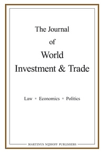
Journal of World Investment & Trade
Charting the Future of Investment and TradeJournal of World Investment & Trade, published by BRILL, is a premier peer-reviewed academic journal that provides a dynamic platform for the exploration of issues related to international investment, trade economics, and the interplay of global markets. With a commendable track record since its inception in 2000 and a current scope extending to 2024, this journal is recognized as an invaluable resource within multiple categories, achieving a Q2 ranking in Business and International Management, and Q1 rankings in prestigious fields including Economics, Law, and Political Science as of 2023. The journal’s emphasis on interdisciplinary approaches to real-world challenges makes it a critical reference for researchers, practitioners, and students alike. Furthermore, it stands out in Scopus rankings with stellar positions across various disciplines, reflecting its impact and relevance in the academic community. While not open access, the journal ensures accessibility through various means, thereby reaching a wide audience eager to engage with cutting-edge research and insights. For those committed to understanding the complexities of global investment and trade, the Journal of World Investment & Trade remains an essential publication to consider.

REVIEW OF WORLD ECONOMICS
Connecting Theory and Practice in EconomicsREVIEW OF WORLD ECONOMICS, published by Springer, stands at the forefront of economic literature, providing a comprehensive platform for scholarly articles that address contemporary global economic issues. With a distinguished Q1 ranking in the field of Economics, Econometrics, and Finance as of 2023, this journal is recognized among the top tier of academic publications, validating its commitment to high-quality research outputs. The journal's Scopus ranking places it at an impressive 70 out of 288 in the discipline, further exemplifying its relevance and impact within the academic community. Covering a wide array of topics from theoretical frameworks to empirical analyses, the REVIEW OF WORLD ECONOMICS invites contributions that not only enhance the understanding of economic phenomena but also propose actionable solutions. With an inclusive open access model enabling broader dissemination, this journal serves as an essential resource for researchers, professionals, and students alike, enriching the global discourse on economics from its base in Germany.
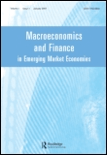
Macroeconomics and Finance in Emerging Market Economies
Decoding the Complexities of Emerging Market EconomiesMacroeconomics and Finance in Emerging Market Economies, published by Routledge Journals, Taylor & Francis Ltd, is a vital scholarly platform dedicated to advancing the understanding and exploration of macroeconomic and financial issues pertinent to emerging market economies. With an ISSN of 1752-0843 and an E-ISSN of 1752-0851, this journal addresses the pressing challenges and dynamic transformations faced by economies in transition, making a significant contribution to the fields of economics and finance. Although currently lacking an open access option, this publication provides a rigorous peer-reviewed outlet for original research, comprehensive reviews, and theoretical advancements. With its convergence years spanning from 2010 to 2024, and retaining a respectable Q3 quartile ranking in both Economics and Econometrics as well as Finance, the journal serves as an influential resource for researchers, professionals, and students engaged in understanding the complexities of macroeconomic policies and financial practices within these rapidly developing regions. Join the discourse and enhance your understanding of current trends and future directions in macroeconomic and financial research within emerging markets.

Economies
Pioneering research in economics, finance, and policy.Economies is a premier open-access journal published by MDPI, dedicated to advancing the fields of economics, econometrics, and finance since its inception in 2013. With an E-ISSN of 2227-7099, the journal plays a vital role in disseminating high-quality research that addresses contemporary global economic challenges, fostering a collaborative platform for scholars, industry professionals, and policymakers alike. The journal is based in Switzerland and has gained significant recognition in the academic community, evidenced by its Q2 ranking in both Development and Economics, Econometrics and Finance categories, along with impressive Scopus rankings—55th out of 242 in Economics and 79th out of 306 in Social Sciences Development. This positions Economies as a key resource for those seeking to stay at the forefront of economic research and thought leadership. The journal’s commitment to open access ensures that valuable insights and findings are readily available to the global research community, enhancing knowledge sharing and innovation in the field.
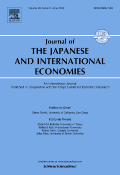
JOURNAL OF THE JAPANESE AND INTERNATIONAL ECONOMIES
Bridging Research and Policy in Economic DiscourseJOURNAL OF THE JAPANESE AND INTERNATIONAL ECONOMIES, a prestigious publication from Academic Press Inc. Elsevier Science, has been a vital contributor to the fields of economics, finance, and political science since its inception in 1987. With an impressive impact factor and recognized within the Q2 category for Economics and Econometrics as well as Finance, and Q1 for Political Science and International Relations, this journal serves as a critical platform for peer-reviewed research that influences both academic discourse and policy-making. The journal is indexed in Scopus, evidencing its prominent position within the scholarly community, with notable rankings of #56 in Political Science and #72 in Finance. Authors and researchers are encouraged to submit their work, contributing to the rich tapestry of knowledge surrounding the economic dynamics of Japan and the broader international landscape. Though it does not offer open access, the journal's subscription model ensures a wide dissemination of its impactful articles, making it essential reading for those aimed at deepening their understanding of economic interrelations and current global issues.
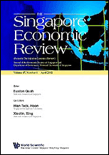
SINGAPORE ECONOMIC REVIEW
Advancing economic insights for a global audience.SINGAPORE ECONOMIC REVIEW, published by WORLD SCIENTIFIC PUBL CO PTE LTD, stands as a prominent platform for research in the fields of economics and econometrics since its inception in 1983. With an ISSN of 0217-5908 and an E-ISSN of 1793-6837, this journal caters to a diverse audience by presenting high-quality, rigorously reviewed articles that address pressing economic issues both in Singapore and globally. Currently classified in the Q3 category for Economics and Econometrics for 2023, it ranks #265 out of 716 in Scopus, placing it in the 63rd percentile among economic journals. Although not open access, the articles published here contribute valuable insights into the evolving dynamics of economic theory and practice, making it an essential resource for researchers, educators, and policymakers alike. The journal's commitment to advancing economic research continues to foster dialogue and inspire innovative approaches within the academic community.
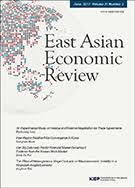
East Asian Economic Review
Connecting Researchers to East Asia's Economic Future.East Asian Economic Review is a premier academic journal dedicated to the multifaceted exploration of economic issues and developments in East Asia. Published by the Korea Institute for International Economic Policy, this journal serves as a vital platform for researchers, practitioners, and policymakers interested in the region's economic dynamics. Since transitioning to Open Access in 2013, it has enhanced accessibility, allowing for a broader dissemination of knowledge and fostering collaborative research. While the journal currently does not have an impact factor rating, its commitment to high-quality research continues to attract contributions that significantly advance the understanding of economic policies, trade relations, and market trends in East Asia. The East Asian Economic Review stands out as an essential resource for anyone involved in or studying the intricate economic landscape of one of the world's most dynamic regions.
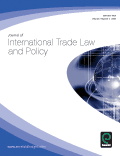
Journal of International Trade Law and Policy
Shaping the Future of Trade Law and PolicyThe Journal of International Trade Law and Policy, published by Emerald Group Publishing Ltd, serves as a crucial platform for the dissemination of research in the fields of international trade law, economics, and political science. Established in 2002, this journal aims to explore the complexities and evolving landscape of trade laws and policies globally, offering valuable insights for researchers, practitioners, and policymakers alike. With an impact factor reflecting its reputable standing, the journal is ranked in the Q3 and Q4 categories across various domains including Law, Political Science, and Industrial Relations, indicating its relevance and contribution to academic discourse. The journal remains committed to advancing knowledge while embracing rigorous peer review processes. Although open access options are currently not available, the journal’s extensive archive promises to be a rich resource for those invested in international trade dynamics as it embarks on its journey toward 2024.
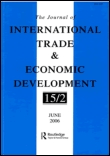
Journal of International Trade & Economic Development
Fostering Knowledge for Global Economic ProgressJournal of International Trade & Economic Development is a premier academic journal published by Routledge Journals, Taylor & Francis Ltd, focusing on the critical interplay between international trade and economic growth within a global context. With an impressive impact factor and ranked in the second quartile for Aerospace Engineering and first quartile for both Development and Geography, Planning and Development in 2023, this journal stands at the forefront of research in its field. The journal's dedicated scope encompasses diverse themes, making significant contributions to the understanding of trade dynamics, development policies, and geographic implications of trade practices. Though currently not open access, the Journal of International Trade & Economic Development is widely recognized for its rigorous peer-review process and commitment to publishing high-quality research articles. As it converges from 1992 until 2024, it serves as an invaluable resource for researchers, professionals, and students aiming to navigate the complexities of trade and economic development on a global scale.